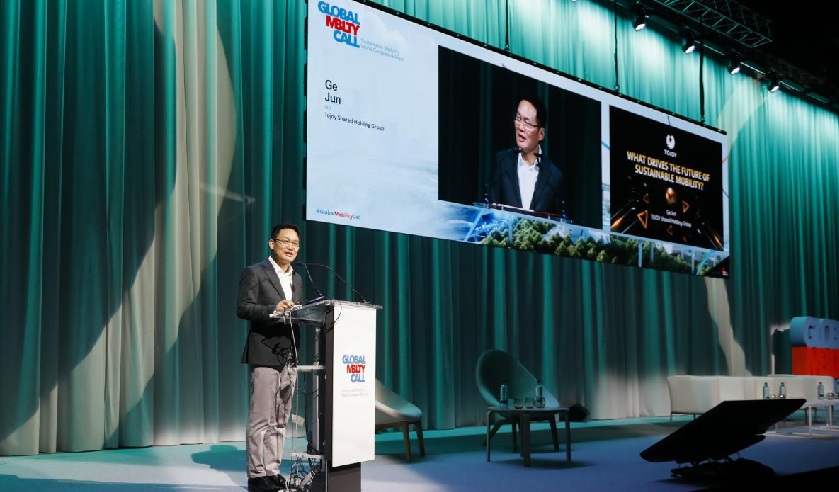Global Mobility Call, the leading transformative event in sustainable mobility, organised by IFEMA MADRID and Smobhub, presents in detail the six pathways that will shape the conference agenda.
These pathways aim to shape topics within the global debate on sustainable mobility, foster public-private collaboration, and discover new alliances.
The programme has been developed in collaboration with the Global Mobility Call GMC Advisory Committee of Experts, along with the event’s Partners, considering all economic, environmental, technological, social, and regulatory perspectives, with a strong focus on supporting the Sustainable Development Goals (SDGs).
Pathway 1: Energy Transition: Driving Mobility Transformation
This first theme explores how the energy transition presents an opportunity to unite solutions aimed at mitigating the impact of all modes of transport and mobility emissions.
It will address global challenges such as reducing CO2 emissions, as well as forward-looking multi-energy strategies and the necessary investments in technology, infrastructure, storage, critical minerals, and networks.
This pathway will highlight energy solutions such as green hydrogen, SAF, electrification, biofuels, alternative clean energies, and energy transition.
It will also delve into electrification and storage, including batteries, charging infrastructure and energy, and critical minerals, as well as the importance of public-private policies and collaboration.
Finally, it will cover sustainable investment, ESG strategies, and talent in this field.
Pathway 2: Urban Mobility: Public Transport and Shared Mobility Solutions
This pathway will explore the role of technology, user behaviour changes, and regulatory advances in reshaping urban mobility.
It will cover topics such as optimising car use and integrating various sustainable public transport modes, including electric vehicles, urban buses, the underground, commuter trains, bicycles, and VTCs.
The advantages of public-private collaboration in creating efficient and equitable mobility solutions that enhance accessibility will also be discussed.
The pathway will encompass urban and shared mobility, MaaS, public transport, and multimodal mobility.
It will also delve into digital platforms and data sharing and usage to promote connectivity, as well as AI, Edge, and IoT systems.
The goal is to achieve up-to-date urban and infrastructure planning with real-time traffic data or LEZ (Low Emission Zones). Experts will also highlight the importance of good policies and investment.
Pathway 3: Intermodal Transport: Efficient and Sustainable Mobility
This pathway will focus on transforming intermodal transport systems to achieve sustainable passenger and goods logistics through digitalisation and alternative clean energies.
It will include topics related to transport evolution, the incorporation of smart and digitalised infrastructure, and the adoption of green energies, among others.
Intermodal and integrated transport will be key in this pathway, detailing air, maritime, land, and rail transport, and critical infrastructures, as well as other issues like logistics and Last Mile or intermodal hubs.
Automotive, fleet management, heavy transport, and electric vehicles will also be covered.
Energy solutions, policies related to these issues, and necessary strategies will be discussed.
Pathway 4: Smart Mobility Planning: Designing More Liveable Urban Spaces
This pathway will address new trends in transport and urban planning, the 15-minute city model, smart traffic management systems with shared data centres, active mobility (cycling and walking), green public transport, autonomous vehicles, and hubs to establish the future of sustainable mobility in cities and regions through more advanced urban planning.
Autonomous and connected mobility will feature prominently, covering aspects such as autonomous driving, safety, connectivity, and cybersecurity.
Topics like urban and shared mobility, platforms for promoting and planning future liveable urban environments, and the resources needed for efficient implementation will also be addressed.
Pathway 5: The Transformation of the Automotive Industry: Adapting to a New Era of Mobility
This pathway will explore the transformation of the automotive industry in response to new mobility trends. It will review the shift towards a new business model and value chain driven by connected, autonomous, shared, and electrified mobility.
Key topics will include the transition to electric vehicles, new charging and battery technologies, the role of data in optimising transport, the emergence of software-based vehicles, and the importance of public-private collaboration and investment in developing electrification infrastructure and incentive systems.
Energy solutions, electrification and storage, autonomous and connected mobility, digital and data platforms, automotive, investment, and public policies and collaboration will be among the topics covered by experts.
Pathway 6: Technological Trends: Accelerating the Mobility Revolution
In a world where the application of intelligent systems is already a reality, this pathway will explore how digital technologies and innovation are accelerating the mobility revolution.
Topics will include the role of cutting-edge technologies such as AI, IoT, 5G, Edge Computing, ICT platforms, smart digital infrastructure, and intelligent transport systems (ITS) in creating new business models and mobility services.
The rise of non-ownership models and MaaS, connected and automated mobility, and multimodal transport will also be covered.
The pathway will primarily address energy solutions, urban and shared mobility, autonomous and connected mobility, as well as digital platforms and data handling.
About Global Mobility Call (GMC)
Organised by IFEMA MADRID and Smobhub, with the sponsorship and support of the Ministry of Transport and Sustainable Mobility, Global Mobility Call was established in 2022 as a strategic event to position Spain as the international hub for sustainable mobility.
It emerged in a pivotal context of post-pandemic recovery and a landscape of business development and investment opportunities facilitated by the Next Generation EU funds, the largest stimulus ever seen in Europe, and the European Green Deal, the roadmap to make Europe the first carbon-neutral continent by 2050.
With a global vision, GMC will bring together leaders from all sectors involved at its third edition, from 19 to 21 November 2024, at the Madrid Fairgrounds to share their views on the development of sustainable mobility policies and business initiatives.







